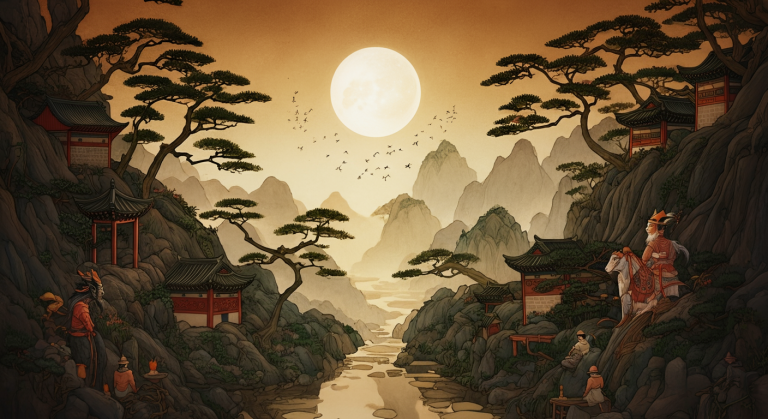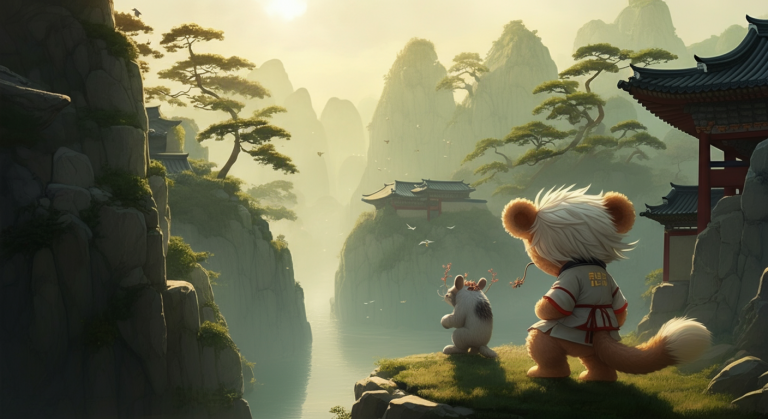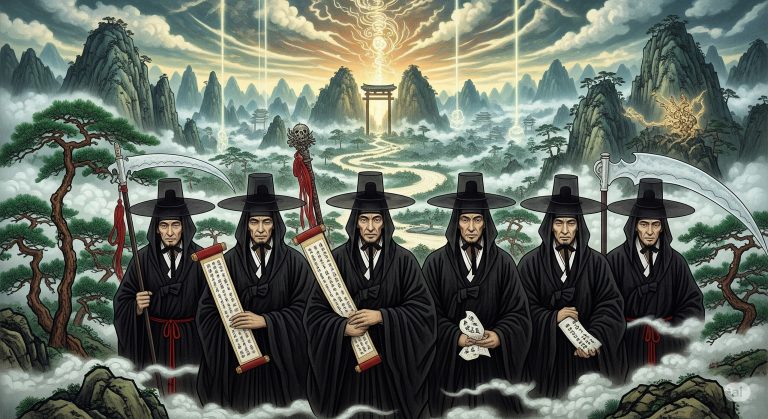Hunchbacked old man: What is Greed’s Limit?
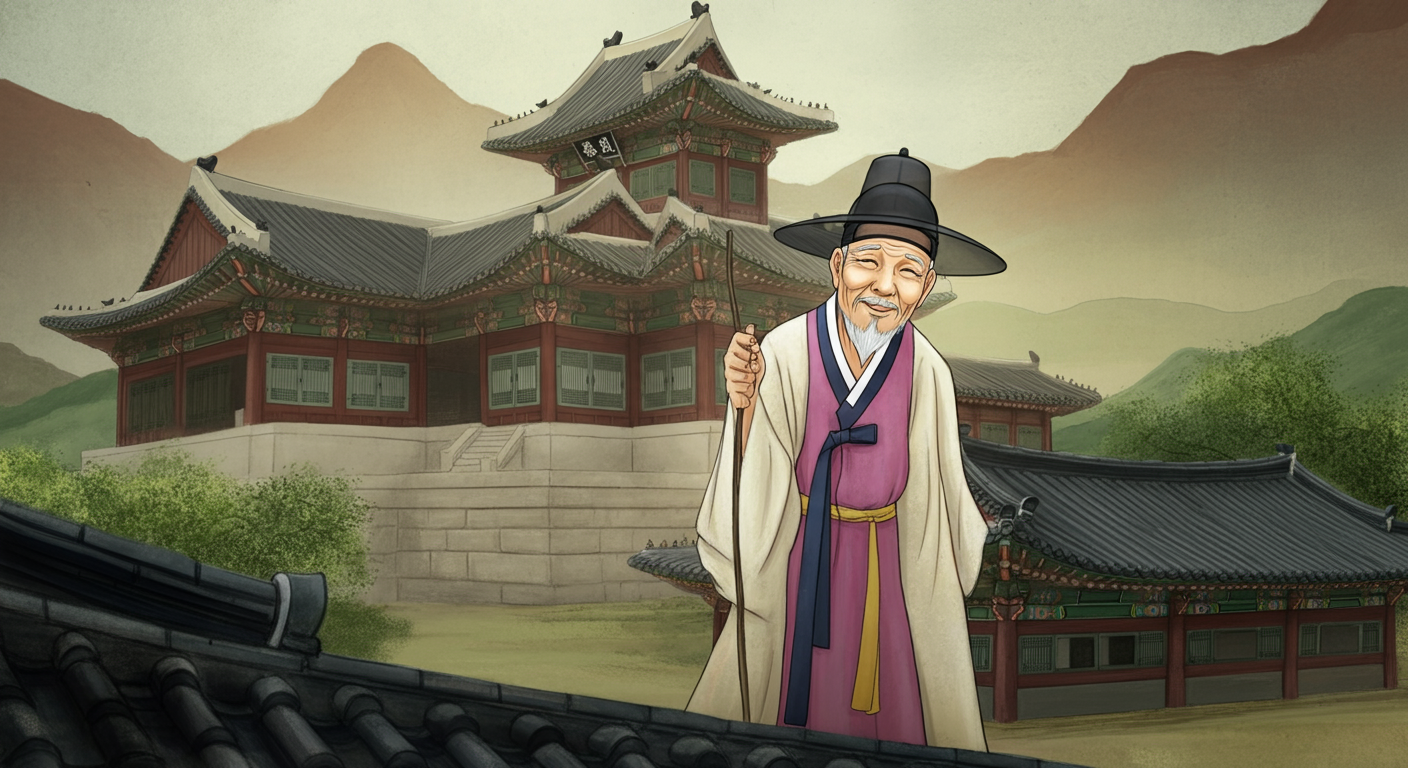
Have you ever heard the captivating tale of the **Hunchbacked old man (혹부리 영감)**, a classic Korean fairytale that holds timeless lessons about greed and fate? As someone who grew up with these enchanting stories, I can tell you that few tales capture the imagination and offer such profound wisdom as the story of 혹부리 영감. It’s a narrative that goes far beyond a simple moral, diving deep into the human psyche and questioning the very nature of desire.
Trust me on this one: while K-dramas give us thrilling plots and K-pop delivers addictive beats, Korean fairytales are the bedrock, the **스토리텔링 (seutoritelling)** that shapes the Korean soul. They’re filled with elements that you’ll recognize if you’re a fan of Korean culture – a dash of supernatural, a sprinkle of everyday life, and a powerful lesson hidden beneath an engaging plot. The story of the Hunchbacked old man (혹부리 영감) is a perfect example, a narrative that has been passed down through generations, still resonating today with its sharp commentary on **욕심 (yokshim)**, or greed.
Growing up, my grandmother would often tell me this story, her voice weaving magic as she described the kindly old man and his unfortunate neighbor. It wasn’t just a bedtime story; it was a gentle reminder about what truly matters in life. And here’s the fascinating backstory: this tale, at its heart, asks us to ponder a crucial question: where does human greed end? In our modern world, constantly pushing for “more,” this question feels more relevant than ever. From the high-stakes world of K-drama chaebols battling for power to the relentless pursuit of perfection in K-pop, the shadows of ambition and unchecked desire are never far. So, let’s peel back the layers of this ancient story and discover how the Hunchbacked old man (혹부리 영감) continues to offer profound insights into our contemporary lives. Are you ready for a journey into the heart of Korean folklore?
Hunchbacked old man: The Tale of Two Neighbors
Our story begins with two elderly men, both living simple lives, yet vastly different in character. The first, our original Hunchbacked old man (혹부리 영감), was a kind-hearted soul, known for his gentle disposition and his love for singing. Despite carrying a prominent hunch on his back, he was content with his lot, often spending his days humming joyful tunes. He lived humbly, finding happiness in the small things. His spirit embodies a certain Korean **정 (jeong)**, a warm, deep affection and connection with the world around him. This man was a true reflection of the virtues Korean society traditionally values: humility, kindness, and a peaceful heart.
In stark contrast, lived a neighbor who was also an old man, but one consumed by **심술 (shimsul)**, ill-will, and envy. He had no hunch, but his heart was burdened by an invisible one – the weight of his own relentless greed. He constantly compared himself to others, always wanting more, and was never satisfied. This greedy neighbor would often scoff at the first man’s cheerful demeanor, unable to comprehend how someone with a physical burden could be so happy. Little did he know, their destinies were about to intertwine in a most unexpected and magical way, all thanks to a group of mischievous supernatural beings.
The First Encounter: A Hunch Removed
One stormy evening, the kind Hunchbacked old man (혹부리 영감) found himself sheltering in a remote cave. As the rain lashed outside, he decided to pass the time by doing what he loved best: singing. His voice, though simple, carried a genuine warmth. Soon, strange figures began to emerge from the shadows. These were **도깨비 (dokkaebi)**, Korean goblins, known for their playful nature, magical powers, and sometimes, their love for music and games. If you’ve watched K-dramas like “Goblin,” you’ll have a sense of these intriguing, often powerful, entities!
The dokkaebi were utterly captivated by the old man’s singing. They clapped and danced, delighted by his pure-hearted performance. One particularly pleased dokkaebi asked the old man, “Where does such a wonderful voice come from?” The Hunchbacked old man (혹부리 영감), thinking quickly, pointed to his hunch, attributing his singing talent to it. The dokkaebi, believing the hunch was the source of his melodic gift, offered to buy it from him, proposing a trade of boundless treasures (보물) in exchange. The kind old man, surprised but seeing an opportunity to live even more comfortably, readily agreed. In a flash, his hunch was removed, and he was left with a chest full of gold and jewels. This dramatic scene is often depicted in vibrant folk art, a truly “대박 (daebak)” moment for the old man! For more on how Korean folklore inspires modern narratives, check out our post on The Abandoned Princess Bari: K-Pop Vibe?.
The Greedy Neighbor’s Devious Plan
Upon returning home, the Hunchbacked old man (혹부리 영감) was transformed. Not only was his physical burden gone, but his modest home was now overflowing with riches. His greedy neighbor couldn’t believe his eyes. His heart, already heavy with envy, now burned with intense covetousness. He badgered the first old man, demanding to know the secret to his sudden fortune and the disappearance of his hunch. The kind old man, in his innocent good nature, recounted the entire story, from the stormy night to the generous dokkaebi.
The greedy neighbor, fueled by his insatiable **욕심 (yokshim)**, immediately devised a plan. “If that simpleton could get rid of his hunch and gain riches,” he thought, “surely I, a much cleverer man, can gain even more!” He ignored the genuine warmth and talent that had charmed the dokkaebi. Instead, he focused solely on the transaction: hunch for treasure. His mind raced with visions of grandeur, convinced he could outsmart the spirits and accumulate an even greater fortune. He believed he could simply replicate the actions, without understanding the spirit behind them. This blatant disregard for sincerity is a critical turning point in the tale, setting the stage for a powerful **교훈 (gyohun)**, or lesson.
Dokkaebi, Destiny, and the Dance of Greed
Armed with what he thought was a foolproof plan, the greedy Hunchbacked old man (혹부리 영감)’s neighbor set out for the same cave on a similarly stormy night. His heart wasn’t filled with the joy of music, but with calculation and an overwhelming desire for wealth. He found the dokkaebi in the cave, just as the first old man had described. Without a trace of sincerity or genuine artistic passion, he began to sing, attempting to mimic the joyful tunes he had heard from his neighbor. However, his voice was off-key, his performance forced, and his intentions were painfully clear.
The dokkaebi, being magical beings sensitive to genuine emotions, were not pleased. They quickly recognized the forced nature of his performance and the palpable **욕심 (yokshim)** radiating from him. They had been charmed by the first old man’s pure heart and talent, not merely by the presence of a hunch. This new old man’s clumsy imitation and overt avarice irritated them. They looked at each other, and a mischievous, perhaps even stern, look passed between them. It became clear that this was no longer a delightful exchange, but a reckoning.
The Misguided Performance for the Dokkaebi
The greedy old man sang with all his might, but his voice was harsh and grating, lacking any melody or **정 (jeong)**. He tried to mimic the movements and expressions he imagined the first old man had made, but it all felt artificial. He proudly pointed to his own perfectly normal back, declaring, “My hunch is the source of my magnificent voice!” The dokkaebi, who had previously taken a hunch as a source of talent, now saw through his deception. They perceived not a singer, but a schemer.
They weren’t looking for another hunch to buy; they were looking to teach a lesson. The dokkaebi are not simply givers of gifts; they are often arbiters of karma, reflecting one’s true nature back at them. The greedy man’s performance was not entertaining; it was offensive in its lack of authenticity. His entire demeanor screamed, “Give me your treasure!” without offering anything of true value in return. This failure to understand the spiritual economy of the dokkaebi was his undoing.
Karma’s Unforeseen Twist: The Hunch Returns
Instead of offering him treasure, the dokkaebi, with a flick of their magical powers, declared, “This hunch is not a source of good singing! Take this other hunch, which we bought from the first old man, and see if it helps your voice!” In an instant, the greedy old man found himself burdened not only with his own perfectly healthy back but also with the extra hunch that had once belonged to his neighbor. He now had **two** hunches, one on his front and one on his back, a grotesque and literal manifestation of his doubled greed.
He stumbled out of the cave, terrified and humiliated, his grand scheme in tatters. The riches he had coveted were nowhere to be found; instead, he carried a heavy, visible reminder of his unchecked avarice. This twist in the tale serves as a powerful **교훈 (gyohun)**. It teaches that genuine blessings come from sincere intentions, while **욕심 (yokshim)**, when pursued without conscience, often leads to ruin. The Hunchbacked old man (혹부리 영감)’s story beautifully illustrates the concept of cosmic justice, where actions, good or ill, inevitably return to the doer. The dokkaebi, as supernatural beings, often serve this purpose in Korean folklore, as you can learn more about in this Wikipedia article on Dokkaebi.
From Fairytale to Modern Society: The Endless Pursuit
The timeless narrative of the Hunchbacked old man (혹부리 영감) isn’t just a quaint story from the past; it’s a mirror reflecting the relentless pursuit of “more” that defines much of our modern world. Think about it: how often do we see people, or even fictional characters, driven by an insatiable desire for wealth, power, or fame? This ancient fairytale speaks directly to the consequences of unchecked ambition, a theme that resonates deeply in contemporary Korean society and culture.
Consider the dazzling world of K-dramas, for example. So many popular series, like “The Penthouse,” “Vincenzo,” or “Sky Castle,” revolve around characters consumed by **욕심 (yokshim)**. They scheme, betray, and sometimes even commit heinous acts, all in the pursuit of wealth, status, or revenge. Their downfall often comes not from external forces, but from their own insatiable greed, much like the second old man who gained a second hunch. These dramas offer a modern retelling of the Hunchbacked old man (혹부리 영감)’s lesson, showing us that the “treasure” gained through ill-gotten means or excessive desire often comes with an unbearable price, a new “hunch” of guilt, fear, or loneliness. It’s a sobering reminder that while a **대박 (daebak)** moment might seem appealing, true fulfillment rarely comes from material excess.
The K-Drama Connection: Villains of Avarice
In many K-dramas, the villains are not simply evil for evil’s sake; they are often tragic figures whose humanity has been eroded by an endless hunger for power or money. Their relentless ambition, much like the greedy old man’s desire for more treasure, leads them down a path of self-destruction. Viewers are often left with a feeling of **한 (han)** – a deep-seated sorrow or resentment – for these characters, not because they are inherently bad, but because they lost their way due to unchecked desire.
These stories cleverly weave traditional moral lessons into contemporary settings, highlighting that human nature, for all its advancements, still grapples with the same fundamental flaws. The contrast between characters who find contentment with less and those who lose everything chasing more is a powerful narrative tool, often ending with a satisfying, yet bittersweet, sense of poetic justice. It reminds us that sometimes, enjoying a simple meal of **치킨과 맥주 (chikin-gwa maekju)** with loved ones is more valuable than any amount of gold. For more connections between Korean folklore and modern themes, explore The Abandoned Princess Bari: K-Pop Vibe?.
The Digital Age and the FOMO Effect
Beyond K-dramas, the Hunchbacked old man (혹부리 영감)’s lesson extends to our highly connected digital lives. The constant barrage of curated social media feeds can trigger a modern form of **욕심 (yokshim)** – the fear of missing out (FOMO). We see others’ seemingly perfect lives, their latest luxury purchases, their exotic vacations, and a subtle “hunch” of inadequacy or desire can begin to grow within us. We start to compare, to chase trends, to yearn for what others have, often without considering if it truly aligns with our own values or brings us genuine happiness.
This endless pursuit, this feeling of needing to keep up or surpass, can become a burden heavier than any physical hunch. We might find ourselves working longer hours, spending beyond our means, or sacrificing our peace of mind, all in a bid to acquire more. “그러게요 (geureogeyo),” you might say – “indeed.” The fairytale encourages us to pause and reflect: what “hunch” are we inadvertently adding to our own lives through our desires? This self-reflection is a crucial part of integrating traditional wisdom into modern living, helping us navigate the complex landscape of consumerism and social pressure.
Finding Our Own Hunch: Lessons from Hunchbacked old man for Today
The beauty of the Hunchbacked old man (혹부리 영감) story lies in its timeless philosophical depth. It forces us to confront the question of “enough.” In a society that constantly pushes for growth, accumulation, and personal bests, knowing when to stop, when to be satisfied, is a rare and precious skill. What does “our own hunch” represent in modern life? It’s not always a physical deformity. Often, it’s the weight of anxieties, the stress of comparison, the emptiness of materialism, or the burden of insatiable desires. These invisible hunches can be far heavier than any physical one, silently eroding our contentment and well-being.
The story teaches us that true liberation comes not from gaining more, but from recognizing and releasing the unnecessary burdens we carry. The first old man found peace when his physical hunch was removed, but more importantly, he found peace because his heart was already free of **욕심 (yokshim)**. The second man, despite having a perfectly healthy body, gained a hunch because his heart was heavy with greed. This powerful contrast is the core **교훈 (gyohun)**, a poignant reminder that our internal state dictates our external reality far more than we often admit.
Recognizing the ‘Hunch’ of Modern Desire
So, how do we recognize the “hunch” of modern desire in our own lives? It starts with mindful introspection. Are we constantly striving for the next big thing, or do we appreciate what we already have? Are our aspirations driven by genuine passion, or by societal expectations and the fear of being left behind? The Hunchbacked old man (혹부리 영감)’s story urges us to consider the quality of our desires. Is what we’re pursuing adding value to our lives, or is it simply adding unnecessary weight?
It’s a call to examine the authenticity of our pursuits. Just as the dokkaebi distinguished between genuine joy and forced performance, we too must learn to discern between true needs and manufactured desires. This process can be challenging, but incredibly liberating, leading to a deeper sense of self-awareness and personal fulfillment. It’s about choosing a path of authentic happiness over a hollow pursuit of material gain.
The Path to Contentment (만족): A True Treasure
The ultimate lesson from the Hunchbacked old man (혹부리 영감) is the profound value of contentment (만족). It’s the understanding that true richness isn’t measured by what we possess, but by the peace and joy we cultivate within. This contentment leads to a feeling that Koreans might describe as 훈훈하다 (hunhunhada) – a warm, heartwarming sensation of well-being. It’s the real treasure that no amount of gold can buy.
In a fast-paced world, embracing this wisdom can feel counter-cultural, but it’s a powerful antidote to burnout and dissatisfaction. It’s about finding joy in the small moments, appreciating genuine connections, and focusing on internal growth rather than external accumulation. Just as the first old man lived a peaceful and wealthy life after his encounter, so too can we find our own version of treasure by letting go of unchecked **욕심 (yokshim)** and embracing a heart full of gratitude. For those interested in exploring more about traditional Korean values and culture, consider visiting Visit Korea’s official site or learning about intangible cultural heritage at UNESCO.
**Conclusion**
The timeless tale of the Hunchbacked old man (혹부리 영감) is far more than a simple fairytale; it’s a profound philosophical treatise wrapped in an engaging narrative. It masterfully illustrates the dangers of unchecked **욕심 (yokshim)** and celebrates the enduring power of a kind, content heart. From the mischievous dokkaebi to the stark contrast between two neighbors, every element of this story serves as a powerful reminder: true wealth lies not in what we acquire, but in our state of mind and the authenticity of our intentions.
As we navigate the complexities of modern life, constantly bombarded by messages to strive for more, the wisdom of the Hunchbacked old man (혹부리 영감) offers a refreshing perspective. It encourages us to look inward, to examine the “hunches” we might be carrying unknowingly due to our own desires, and to find the courage to release them. The lesson is clear: a life driven by insatiable greed inevitably leads to burden, while a life lived with contentment and sincerity is the richest treasure of all. So, the next time you find yourself wishing for more, remember the Hunchbacked old man (혹부리 영감) and ponder: where does human greed truly end, and where does true happiness begin? Korean fairytales, indeed, continue to guide us with their enduring wisdom.
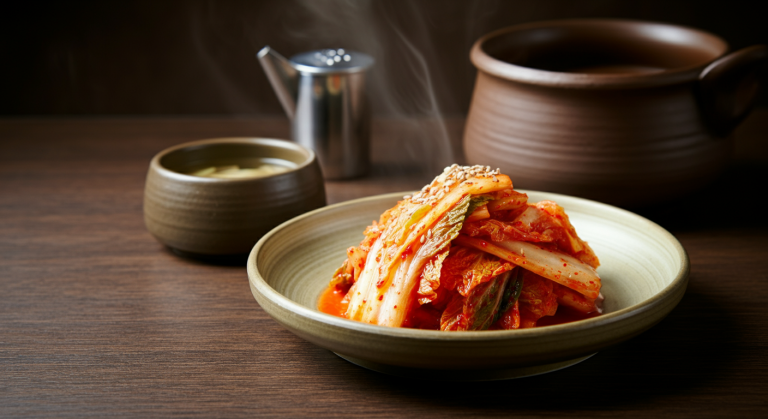
![Dear Mom, I Can’t Come to Dinner Because Baek Sa-eon Just [SPOILER] and I Need 3-5 Business Days to Recover](https://k-vibe.net/wp-content/uploads/2025/08/kvibe-thumbnail-20250829-215006-768x419.png)
